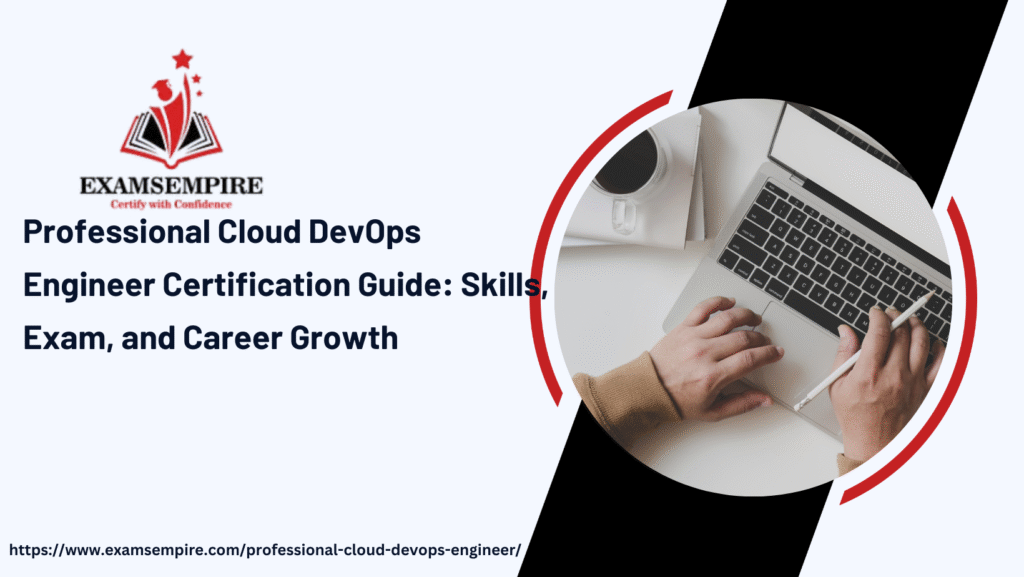The rapid adoption of cloud technologies has transformed how businesses build, deploy, and scale applications. Organizations are looking for professionals who can combine development expertise with operations management to ensure faster, more reliable delivery of software. This is where the Google Cloud Professional Cloud DevOps Engineer certification comes in.
This credential validates advanced skills in applying site reliability engineering (SRE) principles, optimizing services, automating CI/CD pipelines, and ensuring service reliability on the Google Cloud Platform (GCP). In this article, we’ll cover everything you need to know about the certification—its structure, required skills, preparation strategies, and the career advantages it brings.
Who is a Professional Cloud DevOps Engineer?
A Professional Cloud DevOps Engineer is a certified expert capable of building efficient deployment pipelines, monitoring cloud systems, managing incidents, and applying automation strategies. They serve as the bridge between development and operations, helping organizations adopt a culture of continuous integration and continuous delivery (CI/CD).
Their main responsibilities include:
- Designing CI/CD pipelines.
- Automating infrastructure provisioning.
- Managing services and workloads across GCP.
- Applying SRE best practices.
- Monitoring performance and ensuring reliability.
In short, a DevOps Engineer ensures faster deployment cycles without compromising security, compliance, or reliability.

Exam Overview
The Google Cloud Professional Cloud DevOps Engineer exam measures practical and theoretical knowledge across DevOps practices on Google Cloud.
- Exam Name: Google Cloud Certified – Professional Cloud DevOps Engineer
- Format: Multiple-choice and multiple-select questions
- Duration: 2 hours
- Delivery Method: Online proctored or in-person at a testing center
- Prerequisites: No official requirement, but Google recommends 3+ years of industry experience (including 1+ year working with GCP)
- Languages: English and Japanese
Exam Domains
The exam focuses on six major areas:
- Applying Site Reliability Engineering (SRE) principles
- Service level objectives (SLOs), service level indicators (SLIs), and error budgets.
- Managing availability, scalability, and incident response.
- Building and implementing CI/CD pipelines
- Automating deployments.
- Managing source code, testing, and rollbacks.
- Using Cloud Build and Cloud Source Repositories.
- Implementing service monitoring strategies
- Configuring Cloud Monitoring, logging, and alerting.
- Setting up dashboards and uptime checks.
- Optimizing service performance
- Cost optimization, autoscaling, and performance tuning.
- Identifying bottlenecks in services and applications.
- Managing service incidents
- Incident response frameworks, root cause analysis, and recovery strategies.
- Implementing security and compliance strategies
- IAM policies, data encryption, and compliance frameworks.
Skills Required for a Cloud DevOps Engineer
To succeed as a Professional Cloud DevOps Engineer, candidates need both technical and strategic skills:
- Proficiency in GCP Tools: Cloud Build, Cloud Deploy, Cloud Monitoring, Cloud Logging, Artifact Registry.
- SRE Principles: Understanding SLIs, SLOs, and error budgets to balance innovation with stability.
- Automation Skills: Infrastructure as Code (IaC) using Terraform or Deployment Manager.
- CI/CD Expertise: Designing pipelines that support frequent, automated, and reliable releases.
- Incident Management: Root cause analysis, recovery, and risk mitigation strategies.
- Security & Compliance: IAM, encryption, and data protection strategies.
For more information visit us
https://www.examsempire.com/professional-cloud-devops-engineer
Benefits of Earning the Certification
1. High Career Demand
As DevOps culture grows, organizations are actively hiring professionals who can ensure reliability while accelerating innovation.
2. Competitive Salaries
A certified Professional Cloud DevOps Engineer can earn between $120,000 to $160,000 annually, depending on experience and region.
3. Career Versatility
The certification prepares you for roles like:
- Cloud DevOps Engineer
- Site Reliability Engineer (SRE)
- Cloud Architect (with DevOps specialization)
- Infrastructure Automation Specialist
4. Hands-On Expertise
This certification ensures you’re not just learning theory but mastering hands-on automation, monitoring, and deployment practices.
5. Industry Recognition
Earning this credential shows employers that you can handle high-demand projects in cloud automation and service reliability.
Preparation Tips for the Exam
1. Study the Official Exam Guide
Google Cloud provides a detailed exam guide—use it as your roadmap.
2. Hands-On Practice
Theory won’t be enough. Create sample pipelines, deploy applications on GCP, and experiment with monitoring dashboards.
3. Use Official Google Cloud Training
Recommended courses include:
- Preparing for the Professional Cloud DevOps Engineer Exam
- Site Reliability Engineering: Measuring and Managing Reliability
- Continuous Delivery & DevOps on GCP
4. Work on Real Projects
Simulate incident responses, set up monitoring alerts, and manage deployments for practical confidence.
5. Take Practice Tests
Mock exams and practice questions will help you identify weak areas.
6. Join Online Communities
Study with peers on forums, Slack channels, and LinkedIn groups focused on GCP certifications.
Career Path After Certification
With this certification, professionals can progress into advanced roles, including:
- Senior DevOps Engineer – Focused on building enterprise-scale CI/CD solutions.
- Cloud Reliability Architect – Designing high-availability systems.
- Automation Engineer – Specializing in Infrastructure as Code and automated workflows.
- DevOps Consultant – Helping multiple organizations adopt cloud-native DevOps.
Challenges to Keep in Mind
- Broad Scope: The exam covers both development and operations concepts.
- Hands-On Requirements: Without lab practice, passing is very difficult.
- Evolving Technology: GCP services and DevOps practices evolve quickly, requiring continuous learning.
Tips for Overcoming Challenges:
- Focus on SRE concepts like SLOs and error budgets.
- Master Cloud Build, Cloud Deploy, and Cloud Monitoring.
- Practice designing CI/CD pipelines with rollback and automated testing.
The Professional Cloud DevOps Engineer certification pdf dumps is an essential credential for professionals aiming to master the intersection of development and operations on Google Cloud. It validates your ability to implement CI/CD pipelines, monitor services, optimize workloads, and ensure reliability with automation.
As companies shift to cloud-native and hybrid environments, the demand for skilled DevOps engineers continues to grow. This certification doesn’t just improve your technical expertise—it also opens career doors with high salaries and leadership potential.
By combining strong technical skills with site reliability engineering practices, a Professional Cloud DevOps Engineer becomes an invaluable asset for any organization. Whether you’re looking to advance your career, increase earning potential, or stay relevant in the ever-changing IT landscape, this certification is a smart investment in 2025 and beyond.

